
But Capt. Andrew Williams says that’s not true.
“I wanted to squash rumors,” he says.
It’s 4:30 a.m. and female Marine Corps recruits — their hair neatly slicked back in tight buns — are silently eating breakfast in the “Chow Hall.”
The only time they speak is to acknowledge Williams and the other officers sitting at a separate table, a shouted “Good morning ladies, good morning gentleman!” as a sign of respect.
“If you tell these young ladies that they can do anything, they absolutely can,” Williams says.
He’s the commander of an all-female company of recruits at Marine Corps Recruit Depot Parris Island, South Carolina — one of two enlisted boot camps for the U.S. Marine Corps, but the only location where women are trained alongside men.

ABC NewsPHOTO: Marine Corps’ Parris Island
In 2018, it’s expected that 20,000 Marines will graduate from Parris Island, 3,500 of whom will be women.
This year, the men and women will spend more time training side by side than ever before, including a grueling nine mile hike where it turns out the women keep up just fine.
This gender-integrated training is very much on purpose.
“This is where it all begins,” Gen. Glenn Walters, the assistant commandant of the Marine Corps, told ABC News on a trip to Parris Island last week. “This is where honor, courage, and commitment is inculcated in our Marines. So the better we get it here, the easier it is to maintain it throughout their career, make them better citizens when they get back out in society, or continue to serve in the Marine Corps.”
History-making female Marine laid to rest at Arlington National Cemetery
Woman makes history as the Marine Corps’ 1st female infantry officer
Top Marine testifies on explicit-photo scandal: ‘We’ve got to change, and that’s on me’
Walters is not only making better Marines, he’s part of the leadership working to change the culture of the Marine Corps to include how the service handles gender-related issues.
American women have started a broader dialogue about sexual assault and harassment in the workplace — using the hashtag “Me Too” to expose powerful men from Capitol Hill to Hollywood.
Marines and the #MeToo moment
The Marines say their conversation started earlier.
“So in the Marine Corps, we had our hashtag moment over a year ago,” Walters said.
He was referring to Marines United — a private Facebook page publicly revealed last March where male Marines and other service members were sharing tens of thousands of explicit photos, including those of female Marines, without their consent.
After the scandal broke, the commandant of the Marine Corps endured a blistering hearing as senators demanded accountability and a culture change.
“We’re going to have to change how we see ourselves and how we treat each other,” Gen. Robert Neller told Congress, adding, “We’ve got to change.”
It was Walters who led the task force established in the wake of Marines United.
As of Jan. 29, 96 Marines had been identified as persons of interest in the investigation. Of that group, 54 had received some sort of punishment ranging from criminal court martial, to administrative action like separation from service or letters of reprimand that make it more difficult to rise in rank.
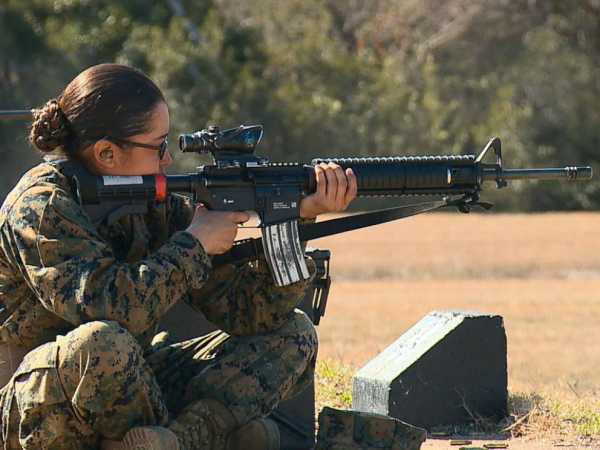
ABC NewsA woman trains at Marine Corps Recruit Depot Parris Island in South Carolina, Feb. 1, 2018.
But under the trees draped with Spanish moss on Parris Island, Walters is focused on recruits — examining how men and women see each other during 13 weeks of boot camp before they ever log on to Facebook, much less work together in a war zone.
Unlike other military branches, the Marines do not integrate men and women at boot camp.
Instead, the first three battalions are all-male, while the fourth battalion is all-female.
The structure may seem odd at a time when the Marines are trying to change how men view women. After all, the Marines have the lowest percentage of women (about 8 percent) compared to other services and combat roles opened to women in 2015.
Though the Marines were the most reluctant service to integrate women into combat jobs and they lag behind the Army in getting women into those roles, there have been notable successes, including the first female tank officer in April and the first female infantry officer in September.
But Lt. Col. Misty Posey, who leads the all-female 4th Recruit Training Battalion, doesn’t see gender segregation as a detriment.
During boot camp, each platoon of roughly 60 to 70 recruits is together nearly 24 hours of every day. The Marines view training as taking place from the 4 a.m. wake up call to the 8 p.m. bedtime with some of the most important instruction occurring in the “squad bays,” or the rooms where recruits sleep.
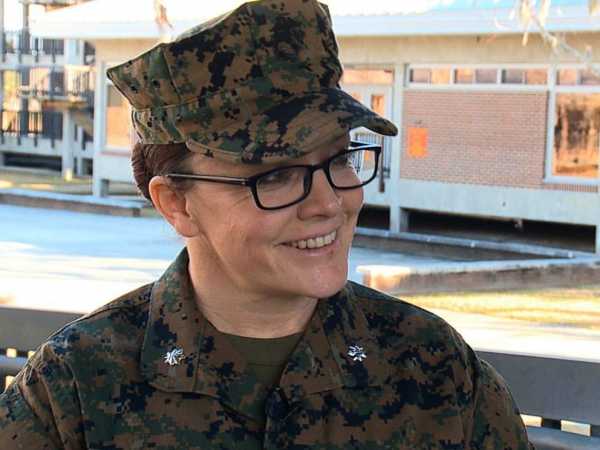
ABC NewsLt. Col. Misty Posey, Commanding Officer, 4th Recruit Training Battalion speaks with ABC News at at Marine Corps Recruit Depot Parris Island in South Carolina, Feb. 2, 2018.
In the squad bays, drill instructors lead “core value guided discussions” and teach Marine Corps history. It’s in the squad bays that recruits use nail clippers to remove every stray thread on their uniforms each morning and clean their weapons before getting into their bunk beds each night.
“At the end of the day, really there is no end of the day, and the end of the day they go back to their squad bay and training continues,” Posey said. “So it’s a training environment to transform them into Marines, so it would be an awkward construct to have a [gender] integrated platoon at this level in training and then at night have the men and women separate and then go sleep separately.”
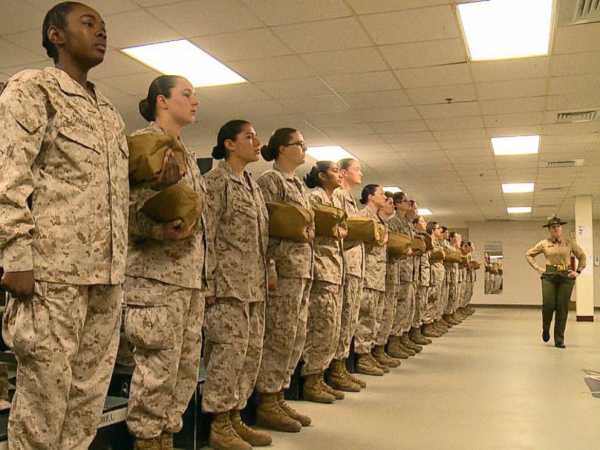
ABC NewsFemale recruits stand at attention in a barracks at Marine Corps Recruit Depot Parris Island in South Carolina, Feb. 2, 2018.
Despite keeping men and women in separate platoons, the Marines are working to increase the amount of training the genders do together, an action Posey and other leaders at Parris Island praised as positive for the Corps.
“The value of increasing the amount of integration that occurs between male and female recruits is that with increased exposure and socialization we address some of the attitudes that male recruits might have about female recruits and vice versa,” Posey said.
Recruits see each other on the rifle range, at the rappel tower, and at religious services.
But beyond these events where the genders are merely operating side by side, the Marines have purposefully combined men and women where they’re actually interacting, like in the “gas chamber” where recruits learn to master a gas mask or during the Physical Fitness and Combat Fitness Tests.
Male and female recruits complete the Combat Fitness Test exercises together: running side by side, facing each other while lifting the same 30-pound ammunition can over their heads, and sometimes even carrying one another on their backs.
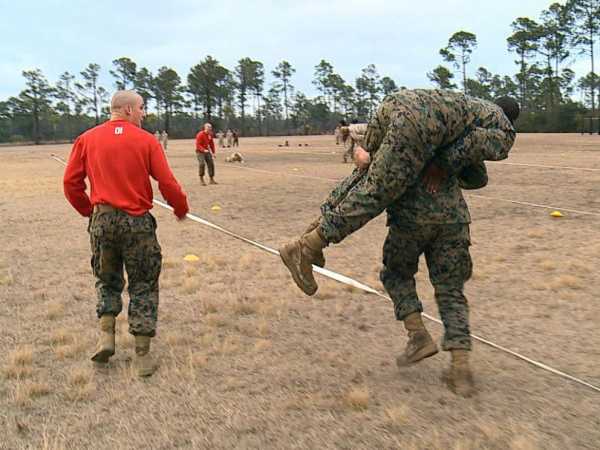
ABC NewsRecruits train at Marine Corps Recruit Depot Parris Island in South Carolina, Feb. 2, 2018.
Standing on the field as the sun rose over the trees, one male drill instructor remarked that the men and women run their fastest times when they’re competing side by side.
The genders are also integrate during the end of “The Crucible:” the 54-hour culminating event of training where recruits face physical, mental, and moral challenges with only eight hours of sleep over the three days. They now hike the last nine miles of the event together.
Upon completion, the recruits are given the emblem of the Marine Corps: the Eagle, Globe, and Anchor, officially becoming Marines.
Posey believes these shared hardships create bonds from the beginning of their time in the service, which will prove particularly important as they are put into gender-integrated platoons in training after Parris Island.
“I think the more exposure male and female recruits have to working together early on it has downstream positive effects,” Posey said. “So they see male recruits see female recruits doing the same exact things they are to earn that Eagle, Globe and Anchor, and they know that they are a Marine just like them. And when they don’t see it, sometimes they don’t believe it.”

ABC NewsRecruits watch a presentation at Marine Corps Recruit Depot Parris Island in South Carolina, Feb. 1, 2018.
In November, the Marines introduced a new phase to the end of training, marking the first substantial change to boot camp in a decade and providing another opportunity to integrate men and women.
After The Crucible, the new Marines will no longer do one week of classroom instruction, but two. Called “Phase Four,” the change is meant to provide new Marines with life skills, tackling a range of issues like hazing, social media, future educational opportunities, fitness, substance abuse, marriage, domestic violence, finances, driver safety, and sexual responsibility.
The first group at Parris Island to complete Phase Four graduates this month. The Marines said the idea has intrigued other services who have already come to Parris Island to check out the new program.
A changing Marine Corps
Walters is expecting the number of women in the Marine Corps to crest at 11 percent this year, up from about eight percent currently. He said that if the service has the “good fortune” to boost the numbers of female recruits significantly one day, they would consider opening San Diego’s boot camp to women as well.
“We would have to accommodate them somewhere,” he said. “And all options are still available.”
Walters also pointed out that efforts to change the way Marines treat each other means holding senior leaders accountable. The Marines relieved six commanding officers last year, four partly due to how they treated others.
But it wasn’t just senior leaders.
Parris Island made national headlines in 2016 when a Muslim recruit, Raheel Siddiqui, committed suicide after being hazed by a drill instructor there. In November, that drill instructor, Gunnery Sgt. Joseph Felix, was sentenced to 10 years in prison for abusing young recruits, including Siddiqui — one of six drill instructors charged with abuse following that suicide.
“The Marine Corps is no different than this country,” Walters said, reflecting on the Me Too movement. “We need to be a team. If we don’t have dignity and respect for every member of the team, then we will not be successful in combat or in life, and I think that is a lesson the country can learn. That dignity and respect for all who are around you is the best society for us as a free people.”
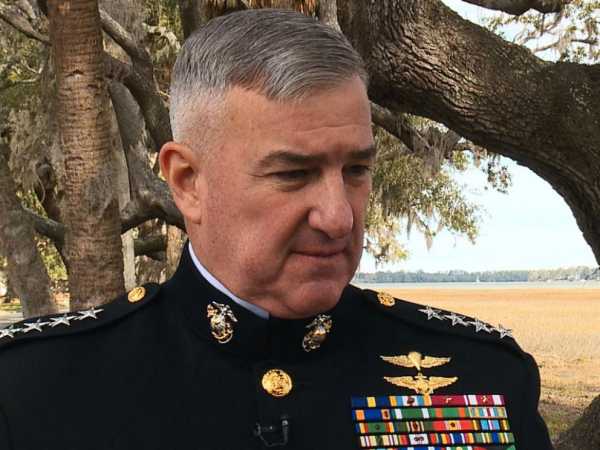
ABC NewsGen. Glenn Walters, Assistant Commandant of the Marine Corps speaks with ABC News at at Marine Corps Recruit Depot Parris Island in South Carolina, Feb. 2, 2018.
On a chilly Friday morning, hundreds of families and friends gathered in metal bleachers facing a concrete parade field on Parris Island to watch a group of graduating Marines, many just eighteen or nineteen years old.
As the official ceremony concluded, the crowd rushed the field, among them the parents of Private First Class Heather Wangenstein.
Despite having just completed a difficult thirteen weeks of boot camp, Heather spoke excitedly about the training ahead of her. She had always wanted to serve in the military police, inspired to join the Marine Corps at just 16 when she met a Marine who impressed her by the way he carried himself.
With tears in his eyes, Heather’s father explained how her letters home had evolved throughout her training, a sentiment several other parents shared.
“She felt she didn’t deserve it, but she worked hard,” he said. “She’s proud to be a Marine, a beautiful Marine.”
Sourse: abcnews.go.com






